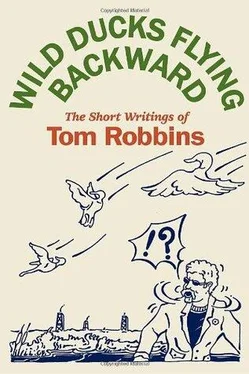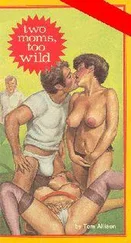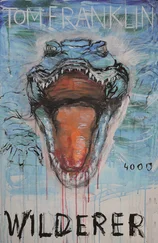Ironically, it’s this same malignant narcissism, revealing itself through whining, arrogance, avarice, pique, anxiety, severity, defensive cynicism, and aggressive ambition, that is keeping the vainglorious out of their paradise. Among our egocentric sad-sacks, despair is as addictive as heroin and more popular than sex, for the single reason that when one is unhappy one gets to pay a lot of attention to oneself. Misery becomes a kind of emotional masturbation. Taken out on others, depression becomes a weapon. But for those willing to reduce and permeate their ego, to laugh — or meow — it into submission, heaven on earth is a distinct psychological possibility.
III
It’s good to bear the preceding in mind when trying to comprehend the indignation with which the East Coast establishment greets work that dares to be both funny and deadly serious in the same breath. The left-handed path runs along terrain upon which the bowtiesattvas find it difficult to tread. Their maps are inaccurate and they have the wrong shoes. So, hi ho, hi ho, it’s off to the house of woe they go.
Nobody requires a research fellowship to ascertain that most of the critically lauded fiction of our time concentrates its focus on cancer, divorce, rape, racism, schizophrenia, murder, abandonment, addiction, and abuse. Those things, unfortunately, are rampant in our society and ought to be examined in fiction. Yet, to trot them out in book after book, on page after page, without the transformative magic of humor and imagination — let alone a glimmer of higher consciousness — succeeds only in impeding the advancement of literature and human understanding alike.
Down in Latin America, they also write about bad marriages and ill health (as well as the kind of governmental brutality of which we in the U.S. so far have had only a taste). The big difference, though, is that even when surveying the gritty and mundane aspects of daily life, Latin novelists invoke the dream realm, the spirit realm, the mythic realm, the realm of nature, the inanimate world, and the psychological underworld. In acknowledging that social realism is but one layer of a many-layered cake, in threading the inexplicable and the goofy into their naturalistic narratives, the so-called magic realists not only weave a more expansive, inclusive tapestry but leave the reader with a feverish exaltation rather than the deadening weariness that all too often accompanies the completion of even the most splendidly crafted of our books.
Can we really take pride in a literature whose cumulative effect is to send the reader to the bridge with “Good Night, Irene” on his lips?
Freud said that “wit is the denial of suffering.” As I interpret it, he wasn’t implying that the witty among us deny the existence of suffering — all of us suffer to one degree or another — but, rather, that armed with a playful attitude, a comic sensibility, we can deny suffering dominion over our lives, we can refrain from buying shares in the company. Funnel that defiant humor onto the page, add a bracing shot of Zen awareness, and hey, pretty soon life has some justification for imitating art.
Don’t misunderstand me: a novel is no more supposed to be a guidebook to universal happiness than a self-indulgent journal of the writer’s personal pain. And everyone will agree, I think, that crime is a more fascinating subject than lawful behavior, that dysfunction is more interesting than stability, that a messy divorce is ever so much more titillating than a placid marriage. Without conflict, both fiction and life can be a bore. Should that, however, prohibit the serious author from exploring and even extolling the world’s pleasures, wonders, mysteries, and delights?
(Maybe all this neurotic, cynical, crybaby fiction is nothing more than the old classroom dictum, “Write what you know,” coming back to haunt us like a chalky ghost. If what you know best is angst, your education commands you not to waste a lot of time trying to create robust characters or describe conditions on the sunny side of the street.)
In any case, the notion that inspired play (even when audacious, offensive, or obscene) enhances rather than diminishes intellectual rigor and spiritual fulfillment; the notion that in the eyes of the gods the tight-lipped hero and the wet-cheeked victim are frequently inferior to the red-nosed clown, such notions are destined to be a hard sell to those who have E. M. Forster on their bedside table and a clump of dried narcissus up their ass. Not to worry. As long as words and ideas exist, there will be a few misfits who will cavort with them in a spirit of approfondement —if I may borrow that marvelous French word that translates roughly as “playing easy in the deep”—and in so doing they will occasionally bring to realization Kafka’s belief that “a novel should be an ax for the frozen seas around us.”
A Tibetan-caliber playfulness may not represent, I’m willing to concede, the only ice ax in the literary toolshed. Should there exist alternatives as available, as effective, as potent, nimble, and refreshing, then by all means hone them and bring them down to the floe. Until I’ve seen them at work, however, I’ll stand by my contention that when it comes to writing, a fusion of prankish Asian wisdom, extra-dimensional Latin magic, and two-fisted North American poetic pizzazz (as exotic as that concept might seem to some) could be our best hope for clearing passageways through our heart-numbing, soul-shrinking, spirit-smothering oceans of frost. We have a gifted, conscientious literati. Wouldn’t it be the cat’s meow to have an enlightened, exhilarating one, as well?
Harper’s, 2004
From an author’s perspective, writing about sex is risky, because if you write well enough, evocatively enough, vividly enough, you make the reader want to put the book aside and go get laid. Writing about food is dangerous for much the same reason, except, of course, that you chance driving your audience to table rather than to bed.
Because it takes more resolve to suddenly flee a theater than to abandon a novel, the filmmaker is largely immune from the danger of over-stimulating captive appetites, although the aftereffect of certain movies can be quite interesting. Tampopo, for example, may have been the most conflicting film ever produced for the reason that at its conclusion, at least ninety percent of couples in attendance were surely in an absolute quandary over which to run and do first: feed or fuck.
In my private life, I’ve endeavored to award a fair, unbiased share of attention to each of the sensual pleasures. In my novels, however, it’s a different matter. Risky or not, I’ve simply been unable to resist the temptation to write about sex, but except for riffs on vegetable stir fry and banana Popsicles in Half Asleep in Frog Pajamas, and a well-deserved ode to mayonnaise in Villa Incognito (not exactly fare destined to activate the saliva glands of your typical gourmet), I’ve been willing to leave culinary fiction in the garlic-scented hands of such masters of dinner-plate drama as Jim Harrison and Thomas McGuane. If the pages of my novels are ever damp, it’s likely from a substance other than drool.
When, a few years ago, an editor informed me that she was compiling an anthology in which selected celebrities would talk about their most favorite food, I declined to contribute — and not only because I find it impossible to think of myself as a “celebrity” without laughing. I must confess, however, that I seriously considered the topic for a day or two; and recently, after a pal posed the question (he must have been stoned, the wicked fellow), “If you were on death row, what would you request for your last meal?”, I gave the subject further attention. I’m thinking about it still…
Читать дальше












